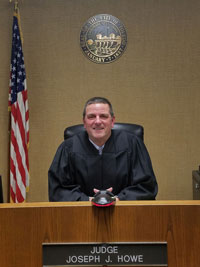The History of the Housing Court
During a time when housing issues were becoming overwhelming, the City and neighborhood officials decided upon a plan to resolve and address the declining houses stock.
While we took a lot of pride in the development of our city and our beautiful waterfront, we could not overlook the sight of abandoned, vandalized and dilapidated structures, scattered throughout our city.
At the urging of many concerned citizens, including the Citizens Monitoring Board, the need for Housing Court was taken under advisement.
After many studies and recommendations, on May 6, 1986, the Toledo City Council unanimously passed a resolution calling for the General Assembly of the State of Ohio to pass legislation to establish a housing court in Toledo.
Finally, after the combined efforts of many dedicated individuals representing several segments of the community and the urging of Ohio Supreme Court Justice Andy Douglas a special docket was created to handle housing and environmental issues in Toledo Municipal Court. In January of 1987, the Ohio Supreme Court granted a waiver of a court rule permitting the Toledo Municipal Court to consolidate the "housing cases" into one docket.
On April 1, 1987, Toledo Municipal Court began a separate housing docket. Judge Judith Ann Lanzinger was appointed to serve as interim Housing Judge.
In 1988, Judge J. Ronald Bowman was installed as the Court's first elected Housing Judge. Growth in the Environmental Court's caseload increased 60% over the number estimated, forcing changes in the very first year of operation. To regulate this change, Judge Bowman added several full-day sessions of Environmental Court in the fourth quarter of 1988.
On July 7, 1989, Judge Roger R. Weiher was appointed to the Environmental Court to fill the vacancy created by the appointment of Judge Ronald Bowman to the Court of Common Pleas. In November 1989 Judge Weiher was elected to fill Judge Bowman's unexpired term ending December 31, 1993. Judge Weiher was reelected in 1993, and remained the Housing Judge until he retired in December 1999. To better manage an ever-increasing caseload, Judge Weiher created a new program entitled, "Monitored Probation." This allowed defendants who were placed on the program to work with court staff in order to achieve compliance.
On January 6, 2000, Judge C. Allen McConnell was sworn in as the Environmental Court Judge to fill the vacancy created by the retirement of Judge Roger R. Weiher. Judge McConnell refined the Monitored Probation Program, now called "Community Control", and expanded the programs availability to handle the steadily increasing number of housing cases. Judge McConnell also implemented, the "First Offender's Program," which assists eligible parties to correct the conditions at their property, which is the subject of the housing case. Participants who successfully complete the program have their cases dismissed by the Court and they avoid a criminal conviction in their case.
On December 21, 2017, the newly elected Judge Joseph J. Howe was sworn in as the Toledo Municipal Housing Court Judge, to replace the retiring Judge C. Allen McConnell. Judge Howe will use his 11 years of experience as a Housing Court Prosecutor to ensure that the Toledo Municipal Housing Court continues to contribute to improving the quality of life in the City's neighborhoods.
In addition to the Housing Court docket, the Housing Judge also handles his share of regular criminal and civil cases. He alternates with the six other judges by serving one week in each of the three mandatory courts: misdemeanor arraignment, felony arraignment, and duties.
The Housing Court docket also includes a civil docket. Civil matters involve landlord-tenant disputes known as Forcible Entry and Detainer actions (FED's) and rent escrow under Chapter 1923 and 5321 of the Ohio Revised Code.
A Housing Magistrate hears all first causes of action cases as well as rent escrow cases wherein tenants deposit rent into an escrow account with the Court because of a dispute with the landlord. The Magistrate's orders are submitted to the Housing Court Judge for approval. In addition to approving the Magistrate's decision, any objection to the Magistrate's orders is referred to the Housing Court Judge for decision or hearing.
Since 1987, substantial changes have occurred in the Housing and Environmental Court as evidenced by the escalating caseload. The Housing Court's jurisdiction has expanded to include cases such as Wildlife (R.C. §1531), Hunting and Fishing (R.C. §1533), Waterways Protection and Pollution (R.C. Titles 37 and 15), and Environmental Services (Toledo Municipal Code, Chapter 9, 11, 15 and 17).
The principal objective of Housing and Environmental Court still remains achieving compliance with the Code; however, the Housing Court is presented with many challenges. First, there are numerous failures to appear. Second, increasing numbers of individuals who appear in Court after filing for bankruptcy and they are not aware that the property is still in their name. This situation creates a unique problem because a mortgage company will typically walk away from the property and leave it in the defendant's name. This problem is aggravated by the fact that the defendant/debtor does not have the resources to repair the property.
Despite the many challenges,the Housing Court staff has taken many initiatives to improve and enhance the effectiveness of Housing Court.
As the numbers of housing cases grow, more time and creativity will be necessary to find the most efficient and cost-effective methods and programs to aid in achieving maximum compliance by those that appear in court. Statistical yearly growth strongly suggests the need to continue to use an evolving and flexible approach to handle the growing housing caseload.
Currently, the Housing Judge hears arraignments on Tuesday and Wednesday mornings. Continuances for compliance and prosecutor pretrials are set for Wednesday afternoons. Housing criminal trials are scheduled on Friday morning dockets. Housing jury trials are held on Mondays. Civil cases are heard by the Housing Judge on Thursdays.


